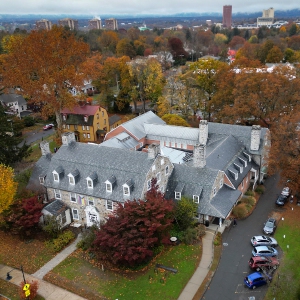State attorney general’s office rejects Shutesbury’s revised solar bylaw

GAZETTE FILE PHOTO
| Published: 11-29-2023 8:49 PM |
SHUTESBURY — The state attorney general’s office has rejected a revised town bylaw governing solar arrays adopted at a Special Town Meeting in January.
The bylaw changes sets limits on where solar arrays can be located, requires special permits for their siting and prohibits standalone battery storage systems.
A Nov. 16 letter from Margaret J. Hurley, assistant attorney general for the Municipal Law Unit, informs Shutesbury officials that the state has disapproved the amended “Ground Mounted Solar Installations” bylaw, adopted by a nearly unanimous vote earlier this year.
The disapproval was based on both a technicality, due to an associated map not being properly posted before a public hearing on the bylaw, and because portions of the bylaw are not in compliance with state law and the Tracer Lane II Realty LLC v. City of Waltham decision by the state’s Supreme Judicial Court. That ruling states cities and towns can’t having zoning regulations that ban solar installations.
The communication from Attorney General Andrea Joy Campbell’s office indicates that the siting limitations in the town bylaw, aimed at protecting large swaths of woodland, were not grounded in “public health, safety or welfare.”
“Although the bylaw makes repeated reference to various reports establishing the important role of forestland in counteracting the effects of climate change, it is not clear that the preservation of ‘large blocks of undeveloped forestland’ is a recognized public health, safety or welfare interest in the context of the Tracer Lane II balancing test,” Hurley writes.
The bylaw’s rejection leaves the town with protections offered in a previous bylaw that remains subject to a lawsuit from PureSky Energy solar company, which is looking to develop five large solar projects on 190 acres.
Still, at a joint meeting between the Select Board and Planning Board on Nov. 21, town counsel Donna MacNicol explained that the town’s 2021 bylaw is still solid. “Disapproving that new solar bylaw now puts us back to the bylaw that existed in 2022,” MacNicol said.
Article continues after...
Yesterday's Most Read Articles
 Granby Bow and Gun Club says stray bullets that hit homes in Belchertown did not come from its range
Granby Bow and Gun Club says stray bullets that hit homes in Belchertown did not come from its range
 Super defers Amherst middle school principal pick to successor; one finalist says decision is retaliation for lawsuit
Super defers Amherst middle school principal pick to successor; one finalist says decision is retaliation for lawsuit
 Political newcomer defeats Shores Ness for Deerfield Selectboard seat
Political newcomer defeats Shores Ness for Deerfield Selectboard seat
 ‘Home away from home’: North Amherst Library officially dedicated, as anonymous donor of $1.7M revealed
‘Home away from home’: North Amherst Library officially dedicated, as anonymous donor of $1.7M revealed
 Town manager’s plan shorts Amherst Regional Schools’ budget
Town manager’s plan shorts Amherst Regional Schools’ budget
 Annette Pfannebecker: Vote yes for Shores Ness and for Deerfield
Annette Pfannebecker: Vote yes for Shores Ness and for Deerfield
The small- and large-scale solar installation bylaw passed in 2021 with a 2022 amendment that allows accessory uses through other parcels.
“It gives almost all of the protections that 2023 did,” MacNicol said, adding that there is language to protect slopes and the biodiversity of sites.
But one of the strongest pieces of the revised bylaw, creating mitigation standards for unpaved roads, is now lost, as is what she said was a well-written purpose section by Planning Board Chairman Michael DeChiara.
MacNicol said the immediate downfall of the bylaw was not getting the solar map, with nine districts, into the amendment process.
“They disapproved this basically because the zoning map embedded in Section 8.10 did not follow the process as required to,” MacNicol said.
The new bylaw would have allowed large-scale solar installations, using between 1½ and 15 acres of land, in only one of the town’s four zoning districts, the Forest Conservation District, and only if granted a special permit by the town Planning Board. They would otherwise be prohibited. “Energy Storage Systems” would also be banned as a principal use in all districts.
MacNicol said Shutesbury’s was first major municipal bylaw the attorney general’s office tackled after the Tracer Lane decision, determining that the ban on independent battery storage systems violates state law.
MacNicol said the state office may also not have had an understanding of how many acres there are available for solar development, even with the restrictions. But the office definitely didn’t like the creation of nine districts, added to the four existing zoning districts, seeing it as in conflict with state law.
“They clearly were not impressed with the solar districts, which was the zoning map issue, and limiting one solar project per district,” MacNicol said.
Select Board Chairwoman Rita Farrell asked if there was a way to remedy this.
MacNicol said amendments could be brought forward to the bylaw, though how soon it could be ready is unknown. “I’m not sure I’d try for the districts again,” MacNicol said.
Former Shutesbury resident Jeff Lacy, who participated in drafting the revised bylaw, said the use of maps and districts has been done in other cities and towns, including Pelham.
But Lacy said it’s also possible that the Tracer Lane decision, and the attorney general “who seems to have policy objectives in mind with what they are doing now,” caused the rejection.

 Sharing a few notes: High schoolers coaching younger string players one on one
Sharing a few notes: High schoolers coaching younger string players one on one Reyes takes helm of UMass flagship amid pro-Palestinian protests
Reyes takes helm of UMass flagship amid pro-Palestinian protests Sole over-budget bid could doom Jones Library expansion project
Sole over-budget bid could doom Jones Library expansion project Amherst poised to hire police department veteran as new chief
Amherst poised to hire police department veteran as new chief 